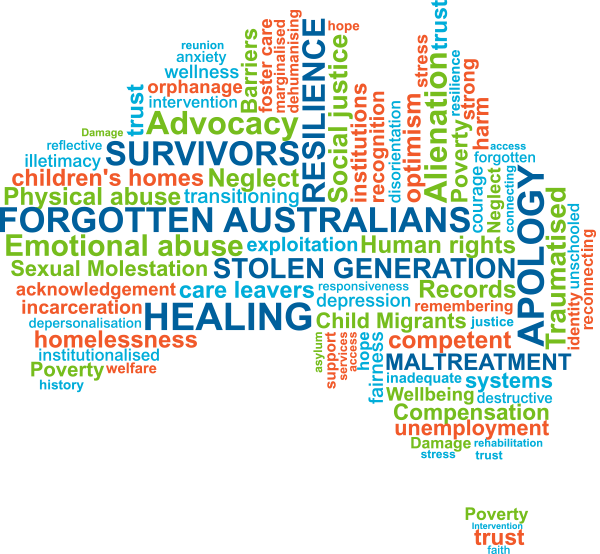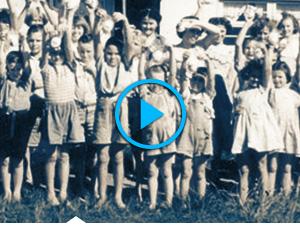What is the LOFA study?

People who have lived in child welfare institutions and other substitute care as children are known to have suffered significant disadvantage over the course of their lives. This research will build knowledge about the range of experiences and outcomes for those who were in institutions and other forms of ‘care’ by asking care leavers themselves about their experiences and how these have affected their lives –physically, emotionally and psychologically. It will identify critical points in care leavers’ lives, and events that have contributed to the development of both positive and negative life outcomes. It will endeavour to contribute to enhancement of service provision to the thousands of Australians who were placed in ‘homes’ as children, with a particular emphasis on what their current circumstances and services they now need, as adults.
Why is it important?
This research is situated in a human rights-based approach, with due recognition that ‘children have the right to protection from violence, abuse and neglect, and from being hurt or mistreated, physically or mentally’ (United Nations - Article 19, Convention on the Rights of the Child, 1989). Adult care leavers require access to services to assist them overcome or cope with the effects of any abuse they may have suffered as children, and redress. The research involves collecting data on the lived experiences of Forgotten Australians. Broadly there are three groups targeted by the research: child migrants (primarily from the UK), children who were placed in institutional care for a variety of reasons, and Aboriginal and Torres Strait Islander persons who were removed from their families (the members of the ‘Stolen Generations’).The research will enhance knowledge about the ‘Forgotten Australians’ who lived in care during the last century in Australia and provide a knowledge base for developing responsive services to improve their current and future health and wellbeing, based on their self reported needs. Building knowledge about life trajectories of this population, identifying resilience factors and coping mechanisms, and gaining insight into transitioning service factors in the post care experience would be extremely helpful in responding to children who are currently in care and will transition out of care in the future.
How is the research being carried out?
The research takes both a statistical and narrative approach. A comprehensive survey seeks to ascertain and quantify the effects that being in ‘care’ had on care-leavers over the course of their lives. The surveys are available online, on paper and can also be completed over the telephone. Interviews and focus groups allow people to discuss their experiences in their own words, and describe the range of experiences and effects that being in a children’s institution or other forms of care had on them. Importantly, this allows people to tell their own story either individually or in the company of other care leavers, and to comment on current policy issues such as unmet needs or service inequities or barriers to services that affect them as adults. Further, participants are provided with the opportunity to discuss current inquiries into institutionalised abuse, what the various formal ‘apologies’ mean to them both emotionally and materially and other issues of concern. Focus groups and interviews are taking place in a variety of capital cities and regional areas throughout Australia, to attempt to maximise participation and gain a national perspective.
Previous inquiries/research and contemporary developments
Overseas and Australian studies document widespread practices in many care institutions that were physically, psychologically and sexually abusive or that constituted neglect (McKenzie, 2003; Mendes, 2005; Penglase, 2005; Sigal, Rossignol, & Perry, 1999). The experiences of children in Australian care systems have been documented in autobiographical accounts such as personal submissions to the Australian Parliament’s Senate Inquiry into Children in Institutional Care and its report ‘Forgotten Australians: A Report on Australians Who Experienced Institutional or Out of Home Care as Children’ (Senate Community Affairs References Committee, 2004) and various State investigations (Forde Inquiry, 1999; Ombudsman, Tasmania, 2006). The Care Leavers Australia Network (CLAN) surveys of its members indicate that abuse, harsh punishment and sexual molestation were reported to be common experiences, and the majority of respondents reported that their lives were impacted by complex mental health issues (CLAN, 2007; CLAN 2011).
Currently, national concern about how children were treated whilst in ‘care’ has culminated in the current Australian Government’s Royal Commission into Institutional Responses to Child Sexual Abuse, particularly in relation to organisations with responsibility for children in their care.
The issues facing Forgotten Australians, Care Leavers, the Stolen Generations and Child Migrants continue to be the subject of further research and commentary to enhance community awareness and mobilise remedial action, policy intervention and redress. For further reading, please see the resources page.

